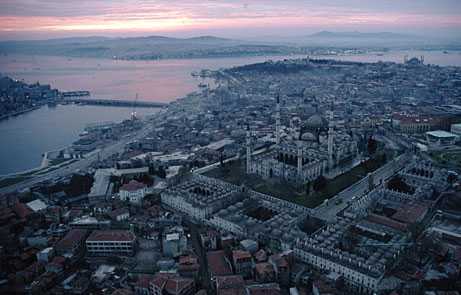 It’s a city of constrasts, brought together by east and west, Islam and Christianity.
It’s a city of constrasts, brought together by east and west, Islam and Christianity.(…)
The people of Istanbul are tolerant by nature … which explains why the mostly Muslim city harbours a significant Jewish presence as well as Greek-Orthodoxy.
(…)
It’s a crossroads between north and south, east and west.
(…)
THE PRESENT PERSPECTIVE: Istanbul is Turkey at its most Western There’s little about the labyrinthine backstreets of the Balat district of Istanbul that suggests anything other than working-class Turkey. Cramped, poor and undeniably Muslim, the area supports the view that Turkey is being invaded by its own peasants, who, leaving the vast plains of Anatolia behind them, bring to the cities their traditional ways and fervent Islamic beliefs.
Amidst all this lie two of Istanbul’s oldest synagogues, their congregation long since departed for Istanbul’s richer residential suburbs. Nevertheless, they’re still in use and one, the Ahrida, is being completely renovated.
Such freedoms subscribe to a more rational view of Turkey which sees it as a living demonstration that a Muslim country can also become a prosperous thriving democracy.
When the majority of the Jews arrived 500 years ago, Istanbul was the thriving capital of the Ottoman Empire. Expelled from Spain during the Inquisition, 200,000 Jews arrived under the protection of Sultan Beyazit II. The 29,000 remaining constitute some of the oldest and most respected families in Istanbul.
“We have been killed the world over, but here in Turkey it was different,” says Nedim Yahya, Co-ordinator of the Quincentennial Foundation of Istanbul, set up to celebrate 500 years of Turkish Jewry. “We want to remind the world that people of different religions, including Muslims and Jews, can live together. A hundred years ago, our language and way of dressing was different, but today they are not.”
Today, any difference lies between Muslims – between the sophisticated, established residents and the new arrivals from the countryside. On the one hand there are women dressed in robes and head scarfs, washing clothes on the streets outside their makeshift houses; on the other are the majority, those women who enjoy all the privileges of their Western sisters, hold down powerful jobs, dress and move about freely. The smart shopping streets around Bayazit Square could be found in any European city, yet the thriving markets and bazaars are distinctly eastern.
Istanbul might be Turkey at its most Western, yet the country as a whole is by no means a land of sheiks and whirling dervishes. Turkey’s quick departure from its old eastern ways was one of the major achievements of Kemal Mustapha – Ataturk, or Father of Turkey. When he, along with the Young Turks, ousted the last of the sultans and formed the Republic of Turkey in 1922, it was with the intention of forming a secular, Westernised state. He began by banning the fez, the most obvious symbol of Islam, and looked west to Europe for allegiance and north to Moscow for industrial inspiration.
Sixty years later, his legacy lives on and even though the call to prayer is regular and penetrating, Islam has as much bearing on day-to-day business in Istanbul as the Church of England does in Britain. But despite Ataturk’s endeavours, Western perception of Turkey is often clouded by the knowledge that its population 98 per cent Muslim and that it is irrevocably oriential.
Things have changed in Istanbul over the last decade. Commerce has flourished profitably within the Ottoman infrastructure, after the military coup of 1980 made way for the leadership of Turgut Ozal in 1983. With Teatcher as his role model, Ozal encouraged free trade and commerce which the Turks took to with alacrity. He disbanded the state-owned industries set up by Ataturk and made him self president in 1989, stemming the unwelcome attention that the growing fortunes of his family had attracted.
There’s an overriding feeling of stability in Istanbul, confirmed by the result of last year’s multi-party election when the present Prime Minister Suleyman Demirel was elected. Despite a somewhat tarnished past – he was ousted by the military coup in 1980 – Demirel heads a government intent on allying with the EC, an ambition hindered by Turkey’s shady human-rights record. The elections also dispelled another Western worry, that Turkey would turn towards Islam, but the Islamic undamentalist party made little impression on the electorate. In the mind of Nadim Yahya, It’s not a worry.
“In the last 50 years the fundamentalist party hasn’t grown one iota. In the election they got about 7 per cent of the vote. And then I feel few of them are voting out of conviction. Erbakan {head of the fundamentalist party} was my schoolmate, we studied side by side for six years. He has no religious conviction. He has found a platform and he’s using it.
“The fundamentalists are supported by a couple of extremists who want Turkey to be like Iran. When I’m asked if I’m concerned about the rise of fundamentalism, I say no. It’s the Muslim world of Turkey that’s concerned.”
In Balat his confidence seems to be justified. An unassuming gate leads off a side street into the quiet courtyard of Yanbol synanogue. Inside, a roof painting depicts scenes of a Macedonian town of the same name, home to the people who founded it centuries ago. And Istanbul remains a place where such antiquated symbols of Judaism can survive alongside the 20th-century mosques, where an ever-increasing influx of peasants can bring a time-honoured tradition to the most progressive of Muslim cities.
WORLD, BBC Magazine of Mankind, November 1992

Leave a Reply